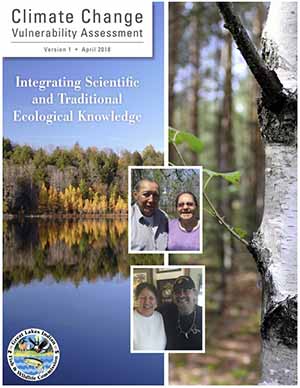Read this in Spanish / lee esto en español
Rob Croll is a climate change coordinator, Melonee Montano is a TEK outreach specialist, Hannah Panci is a climate change scientist, and Aaron Shultz is a climate change inland fisheries biologist for the Great Lakes Indian Fish and Wildlife Commission (GLIFWC).
How is climate change affecting treaty resources?
Climate change is impacting and will continue to impact tribes both directly and indirectly in many ways, including impacts to treaty resources and lifeways (for more information, see our interview with Dylan Jennings). Adaptation to climate change for the tribes is especially challenging due to reservation and treaty boundaries significantly limiting their ability to migrate with the beings (like waabooz/snowshoe hare) on which they depend.

Along with other various Indigenous groups, the Ojibwe have resided on these lands since time immemorial. Historically they lived throughout the northeastern part of North America and along the Atlantic Coast until a prophecy led them to relocate to an area where “food grows on water.” Following the instructions in the prophecy, they moved westward and arrived in their current homelands which include large areas of the United States and Canada around the Great Lakes including what is now known as the state of Wisconsin. It is in these areas where manoomin (wild rice) grows. Manoomin is extremely vulnerable to climate change, and is known to be the “food that grows on water.”
Ojibwe Tribal members reside both on and off reservations and retain treaty rights that include hunting, fishing, and gathering within the Ceded Territories that include the upper third of Wisconsin and parts of Michigan and Minnesota. The Great Lakes Indian Fish and Wildlife Commission provides natural resource management expertise, conservation enforcement, legal and policy analysis, and public information services designed to implement the member tribes’ treaty rights, cooperatively manage natural resources and ecosystems within the Ceded Territories to support those rights, and to promote healthy and safe tribal communities. GLIFWC’s member tribes in Wisconsin include Lac Courte Oreilles, Red Cliff, Bad River, St. Croix, Lac du Flambeau, and Mole Lake.
How is Great Lakes Indian Fish and Wildlife Commission addressing climate change?
GLIFWC, along with its 11 member tribes, is currently assessing the vulnerability of numerous selected beings to climate change. Findings have been summarized for 11 beings in version one of the Climate Change Vulnerability Assessment, which is available to the general public. The second version of the vulnerability assessment will include over 60 beings and will be available later this year. These assessments are intended to help tribes know which beings are likely being impacted by climate change, which will help guide the development of an adaptation plan.
The vulnerability assessment integrates scientific and traditional ecological knowledge. Scientific ecological knowledge was summarized after conducting a literature review and scoring each factor that may make a being vulnerable to climate change. Traditional ecological knowledge was collected by Melonee Montano, GLIFWC traditional ecological knowledge outreach specialist, by conducting interviews with elders, community members, harvesters, and others from eleven member tribes.
The being pages of the vulnerability assessment provide information regarding the cultural significance of each being to the Ojibwe Great Lakes Indian Fish and Wildlife Commission member tribes. In addition, interviews and stories were incorporated into the final vulnerability scores of each being. Ultimately, a Climate Change Adaptation Plan will be crafted in cooperation with the 11 Great Lakes Indian Fish and Wildlife Commission member tribes that includes a focus on the most vulnerable beings in the assessment.
Tribes are and will continue to be disproportionately affected by climate change. In the past the Ojibwe tribes in the Great Lakes region were able to successfully respond to changes in their environment because they were able to move within a large land base. Now tribes are constrained by fixed reservation and Ceded Territory boundaries and may someday lose their ability to maintain relationships with beings that have sustained them for millennia. However, tribes are now demonstrating their adaptability in new ways, including by assessing the vulnerability of culturally important beings, planning for an uncertain future, and leading the fight against climate change.
Learn More
- GLIFWC Climate Change Vulnerability Assessment: Integrating Scientific and Traditional Ecological Knowledge
- Dibaginjigaadeg Anishinaabe Ezhitwaad: A Tribal Climate Adaptation Menu
- Wild Rice Growers Worry About Climate Change Hurting Crops
- Climate change threatens Midwest’s wild rice, A staple for Native Americans
- Wisconsin’s most prized fish has been declining for decades
The views and opinions expressed in this interview are those of the authors and do not represent official policy or position of the University of Wisconsin-Madison or the Wisconsin Initiative on Climate Change Impacts.
For More Information
Rob Croll
Climate Change Coordinator
(715) 682- 6619, ext. 2101
Rcroll@glifwc.org
Melonee Montano
TEK Outreach Specialist
(715) 682-6619, ext. 2116
Mmontano@glifwc.org
Hannah Panci
Climate Change Scientist
(715) 682.6619, ext. 2167
Hpanci@glifwc.org
Aaron Shultz
Climate Change Inland Fisheries Biologist
(715) 682-6619, ext. 2170
aaronshultz@glifwc.org
Great Lakes Indian Fish and Wildlife Commission
72682 Maple Street
Odanah, Wisconsin 54861
(715) 682-9294